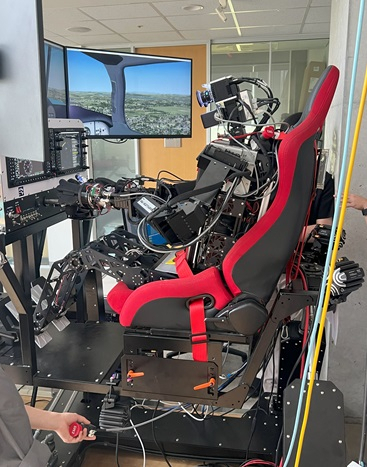KAIST researchers develop world’s 1st humanoid pilot
New robot in consideration for military use
By Kan Hyeong-wooPublished : July 19, 2023 - 15:29

Korean researchers have developed the world’s first humanoid pilot, Korea Advanced Institute of Science and Technology said Wednesday.
According to KAIST, a group of researchers led by professor Shim Hyun-chul demonstrated a human-like robot’s successful flight simulation operation while sitting in the pilot seat of an existing airplane’s cockpit, without making any adjustments for the robot.
Dubbed “Pibot,” the humanoid pilot, which combines artificial intelligence and robotics technologies, can process the natural language of the flight manual and control the flight’s operation in real time.
“(Pibot) is fundamentally different from the autopilot system used on existing aircraft and uncrewed airplanes,” said KAIST.
The humanoid is capable of memorizing global flight charts to conduct mistake-free flight missions on any air route. Pibot can also utilize the AI technology of ChatGPT to store the information of the quick reference handbook -- a quick-access manual for aircraft pilots that contains all the procedures applicable for non-normal and emergency conditions -- and use it to cope with any contingency more quickly than human pilots.
According to KAIST, Pibot can assess both the inside and outside situations during flight by using cameras, unlike traditional airplane robots that carry out repetitive tasks in a fixed position.
Researchers plan to test out the humanoid’s capabilities in a light aircraft, as the robot can already control all of the simulation airplane’s operations, such as taxiing, takeoff, landing and flight. The project is expected to be completely developed in 2026.
Supported by the Agency of Defense Development’s funding of 5.7 billion won ($4.5 million), the humanoid is being reviewed for commercialization in the private and military sectors.
"The humanlike pilot robot is highly practical and useful because it can fly aircraft automatically without modifying existing aircraft," said Shim.
"Because it can control not only aircraft, but also other machines such as cars and armored vehicles, we expect it to be very useful in the current situation where military forces are severely depleted."






![[Weekender] How DDP emerged as an icon of Seoul](http://res.heraldm.com/phpwas/restmb_idxmake.php?idx=644&simg=/content/image/2024/04/25/20240425050915_0.jpg&u=)



![[KH Explains] No more 'Michael' at Kakao Games](http://res.heraldm.com/phpwas/restmb_idxmake.php?idx=644&simg=/content/image/2024/04/28/20240428050183_0.jpg&u=20240428180321)







![[Herald Interview] Mistakes turn into blessings in street performance, director says](http://res.heraldm.com/phpwas/restmb_idxmake.php?idx=652&simg=/content/image/2024/04/28/20240428050150_0.jpg&u=20240428174656)
